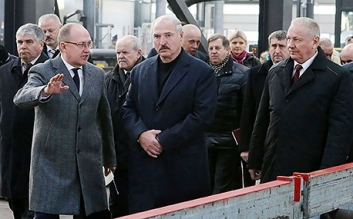All fuss during election campaign in Belarus will be around social issues
 The situation has not changed
The situation has not changed

In 2015, the Belarusian authorities lack resources to maintain social protection at acceptable level and relieve social tension with wage growth. The opposition is attempting to use people’s discontent with the declining level of well-being to promote their visions of socio-economic reforms. However, the authorities are not willing to hold systemic reforms and will attempt relieving tension in society by buying the loyalty of individual ‘protest’ social groups, introducing cosmetic changes in the state policy, and seizing the initiative from the opponents via extensive media resources.
Effects of Maidan and events in Ukraine are gradually losing their influence on people’s moods in Belarus and they are becoming more discontent with the authorities’ social policy. In 2014, citizens’ protest activity increased compared with 2013. Only seven of 52 public events with political overtones were held with the authorities’ consent. In addition, social conflicts have grown in some pro-active social groups, which publicly defend their interests.
It is worth noting that the authorities’ response to political public protests has not changed. Their participants faced heavy fines and days in jail. Penalties have been used even for a single photo of activists with a political message made in a public place and posted on the Internet.
However, where it concerned social conflicts, the authorities had been prompted to start negotiations with protesters, and often met their requirements. For example, in March 2015, following a series of protest actions by individual entrepreneurs, the president ordered to postpone the implementation of the ban on non-certified light industry products. After protests by health care workers in 2014, doctors’ salaries were raised first in Minsk, and then across the country.
The state reacts individually to each case of social conflict without considering systemic reforms. However, as time goes by, administrative measures used by the authorities have fewer effects. Amid languishing resources to preserve the existing socio-economic model, the government’s capacities of control over the situation have diminished.
Meanwhile, the opposition is attempting to take the advantage of the people’s growing discontent with the level of social protection and has proposed transformations in the social sphere. For example, the “People’s Referendum” campaign initiators held an awareness raising campaign and organised a petition with social demands. In addition, in 2014 – early 2015, other political forces, such as Belarusian Christian Democracy, the United Civic Party and civil society organisations pushed for social issues to be included in the political agenda.
Two questions proposed by the “People’s Referendum” organisers for the plebiscite concerns free healthcare and education. The authorities, however, deny that any problems exist in healthcare and education by referring to high positions in the international rankings. Simultaneously, the state is using media in order to step up people’s responsibility in social spheres, in particular, where it is no longer able to maintain acceptable level of protection.
The opposition proposes to improve socio-economic development in the regions by enabling direct elections of city, district and regional heads, who are currently appointed by the president. In response to this initiative by the opposition, the authorities have prepared a directive envisaging measures to develop entrepreneurship and stimulate business initiative. However, the new directive is a copy-paste of the directive from five years ago, which has not led to radical changes in the regions. Namely, the document reads, “… of 118 country’s districts 115 were subsidised, in 53 districts the amount of subsidies exceeded 50% of their budget revenues. This situation demonstrates weakness of the regional policy”.
During the 2015 presidential elections, the opposition is likely to focus on social issues and on the state’s reduced role in ensuring social protection. Meanwhile, the authorities are likely to meet demands of the most active social groups in order to relieve tension in society.
Subscribe to our newsletter




Situation in Belarus
Constitutional referendum: main consequences


 Video
Video
How to count the political prisoners: are the new criteria needed?


 Video
Video
Paternalism In Decline, Belarusian Euroscepticism, And The Influence Of Russia


 Video
Video












